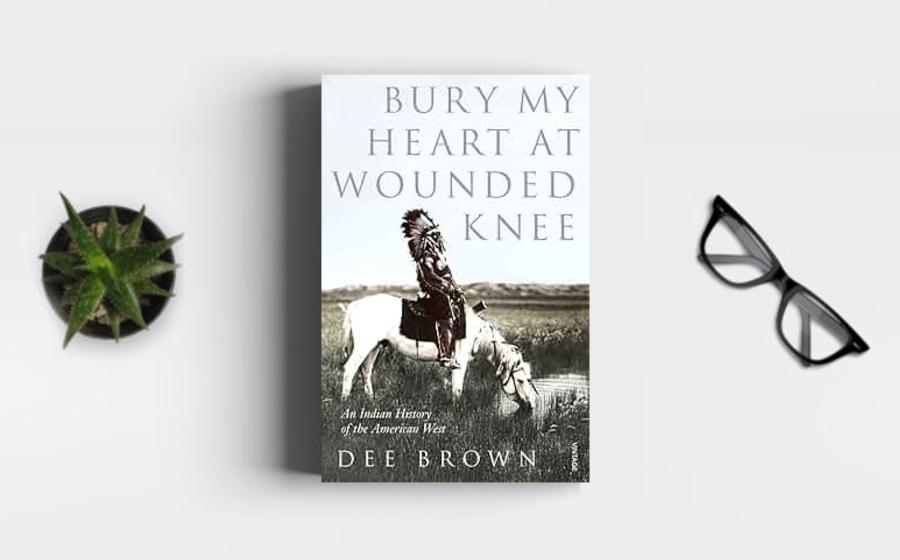"Bury My Heart at Wounded Knee" by Dee Brown is an
extraordinary and heart-wrenching portrayal of the
tragic events that unfolded during the expansion of the
American West in the late 19th century. Published in
1970, this seminal work of narrative history has
rightfully earned its place among the top American
classics of all time. Dee Brown's meticulous research,
empathetic storytelling, and unflinching examination of
the injustices inflicted upon Native American tribes
make this book an indelible account of a dark chapter in
American history.
The narrative unfolds against
the backdrop of the relentless westward expansion,
chronicling the systematic dispossession and destruction
of numerous Native American nations. Brown's masterful
storytelling weaves together a tapestry of individual
narratives, providing a panoramic view of the diverse
cultures, struggles, and tragedies experienced by the
indigenous peoples across the American West.
One
of the defining strengths of "Bury My Heart at Wounded
Knee" lies in Brown's commitment to presenting a
comprehensive and unfiltered account of history. The
author draws extensively from primary sources, including
firsthand accounts, letters, and official records, to
construct a narrative that eschews historical
revisionism and confronts the harsh realities of the
past. By giving voice to the voices silenced by history,
Brown creates a powerful testament to the resilience and
strength of Native American communities.
The
title itself, drawn from a lament by Chief Black Elk,
captures the profound grief and loss experienced by
Native Americans during this tumultuous period. The book
covers a span of three decades, from the mid-1860s to
the early 1890s, documenting a series of devastating
events such as the Sand Creek Massacre, the Battle of
Little Bighorn, and the Wounded Knee Massacre. These
events, along with numerous others, collectively form a
narrative that exposes the betrayal, violence, and
cultural obliteration suffered by Native American
tribes.
The individual stories of Native American
leaders and their communities emerge as poignant
narratives within the larger historical tapestry.
Figures like Sitting Bull, Red Cloud, and Crazy Horse
come to life through Brown's evocative prose, allowing
readers to empathize with the struggles and sacrifices
of these leaders who sought to protect their people and
ways of life. The personal accounts provide a humanizing
element to the historical events, making the impact of
the injustices more visceral and resonant.
"Bury
My Heart at Wounded Knee" also serves as a powerful
critique of U.S. government policies and the actions of
military forces during the westward expansion. Brown
does not shy away from examining the motivations,
decisions, and consequences of government officials,
military commanders, and settlers. The book exposes the
broken promises, deceitful treaties, and ruthless
tactics that resulted in the displacement, suffering,
and death of countless Native Americans. Brown's
fearless exploration of this painful history positions
the book as a vital tool for understanding the
complexities of America's past.
The narrative
structure, divided into distinct chapters corresponding
to significant events, allows readers to comprehend the
chronological progression of Native American
dispossession. The meticulous attention to detail and
the careful contextualization of each event contribute
to a comprehensive understanding of the broader
historical narrative. By presenting a chronological
account, Brown enables readers to trace the cumulative
impact of policies and conflicts on Native American
communities over time.
The lasting impact of
"Bury My Heart at Wounded Knee" is evident in its role
as a catalyst for reshaping public consciousness and
discourse surrounding Native American history. The book
played a pivotal role in challenging prevailing
narratives that often romanticized the westward
expansion or marginalized the experiences of Native
Americans. Dee Brown's narrative opened the door for a
more critical examination of historical events and their
enduring effects on indigenous communities.
The
empathetic portrayal of Native American perspectives and
experiences sets "Bury My Heart at Wounded Knee" apart
as a work that strives for historical accuracy and
cultural sensitivity. Brown's commitment to amplifying
the voices of those who were historically marginalized
and silenced contributes to the book's enduring
relevance and educational value. As a result, the work
has been widely embraced as a resource for educators,
students, and readers seeking a more inclusive and
nuanced understanding of American history.
The
emotional resonance of the book is further heightened by
its title, which captures the heart-wrenching plea for
recognition, remembrance, and justice. The words "Bury
My Heart at Wounded Knee" encapsulate the collective
sorrow and anguish of Native American communities as
they witnessed the devastation of their cultures and
homelands. The title, drawn from Chief Black Elk's
lament, serves as a poignant metaphor for the profound
losses suffered by Native Americans during this dark
chapter in history.
"Bury My Heart at Wounded Knee" stands as an exceptional and enduring American classic that delves into the tragic history of Native American dispossession during the westward expansion. Dee Brown's meticulous research, empathetic storytelling, and unflinching examination of historical truths make this book a powerful testament to the resilience and strength of Native American communities. Its impact on historical scholarship, public awareness, and cultural understanding positions it as one of the top American classics of all time.






